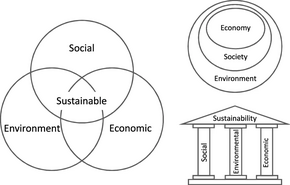
Back Volhoubaarheid Afrikaans Nachhaltigkeit ALS استدامة Arabic Sostenibilidá AST سوردوروله بیلیرلیک AZB Устойлівасць навакольнага асяроддзя Byelorussian দীর্ঘস্থায়িত্ব Bengali/Bangla Održivost BS Sostenibilitat Catalan بەردەوامی CKB

Sustainability is a social goal for people to co-exist on Earth over a long period of time. Definitions of this term are disputed and have varied with literature, context, and time.[2][1] Sustainability usually has three dimensions (or pillars): environmental, economic, and social.[1] Many definitions emphasize the environmental dimension.[3][4] This can include addressing key environmental problems, including climate change and biodiversity loss. The idea of sustainability can guide decisions at the global, national, organizational, and individual levels.[5] A related concept is that of sustainable development, and the terms are often used to mean the same thing.[6] UNESCO distinguishes the two like this: "Sustainability is often thought of as a long-term goal (i.e. a more sustainable world), while sustainable development refers to the many processes and pathways to achieve it."[7]
Details around the economic dimension of sustainability are controversial.[1] Scholars have discussed this under the concept of weak and strong sustainability. For example, there will always be tension between the ideas of "welfare and prosperity for all" and environmental conservation,[8][1] so trade-offs are necessary. It would be desirable to find ways that separate economic growth from harming the environment.[9] This means using fewer resources per unit of output even while growing the economy.[10] This decoupling reduces the environmental impact of economic growth, such as pollution. Doing this is difficult.[11][12] Some experts say there is no evidence that such a decoupling is happening at the required scale.[13]
It is challenging to measure sustainability as the concept is complex, contextual, and dynamic.[14] Indicators have been developed to cover the environment, society, or the economy but there is no fixed definition of sustainability indicators.[15] The metrics are evolving and include indicators, benchmarks and audits. They include sustainability standards and certification systems like Fairtrade and Organic. They also involve indices and accounting systems such as corporate sustainability reporting and Triple Bottom Line accounting.
It is necessary to address many barriers to sustainability to achieve a sustainability transition or sustainability transformation.[5]: 34 [16] Some barriers arise from nature and its complexity while others are extrinsic to the concept of sustainability. For example, they can result from the dominant institutional frameworks in countries.
Global issues of sustainability are difficult to tackle as they need global solutions. Existing global organizations such as the UN and WTO are seen as inefficient in enforcing current global regulations. One reason for this is the lack of suitable sanctioning mechanisms.[5]: 135–145 Governments are not the only sources of action for sustainability. For example, business groups have tried to integrate ecological concerns with economic activity, seeking sustainable business.[17][18] Religious leaders have stressed the need for caring for nature and environmental stability. Individuals can also live more sustainably.[5]
Some people have criticized the idea of sustainability. One point of criticism is that the concept is vague and only a buzzword.[19][1] Another is that sustainability might be an impossible goal.[20] Some experts have pointed out that "no country is delivering what its citizens need without transgressing the biophysical planetary boundaries".[21]: 11
- ^ a b c d e f Cite error: The named reference
Purviswas invoked but never defined (see the help page). - ^ Ramsey, Jeffry L. (2015). "On Not Defining Sustainability". Journal of Agricultural and Environmental Ethics. 28 (6): 1075–1087. Bibcode:2015JAEE...28.1075R. doi:10.1007/s10806-015-9578-3. ISSN 1187-7863. S2CID 146790960.
- ^ Kotzé, Louis J.; Kim, Rakhyun E.; Burdon, Peter; du Toit, Louise; Glass, Lisa-Maria; Kashwan, Prakash; Liverman, Diana; Montesano, Francesco S.; Rantala, Salla (2022). "Planetary Integrity". In Sénit, Carole-Anne; Biermann, Frank; Hickmann, Thomas (eds.). The Political Impact of the Sustainable Development Goals: Transforming Governance Through Global Goals?. Cambridge: Cambridge University Press. pp. 140–171. doi:10.1017/9781009082945.007. ISBN 978-1-316-51429-0.
- ^ Cite error: The named reference
Bosselmann-2010was invoked but never defined (see the help page). - ^ a b c d Cite error: The named reference
Berg-2020was invoked but never defined (see the help page). - ^ "Sustainability". Encyclopedia Britannica. Retrieved 31 March 2022.
- ^ "Sustainable Development". UNESCO. 3 August 2015. Retrieved 20 January 2022.
- ^ Kuhlman, Tom; Farrington, John (2010). "What is Sustainability?". Sustainability. 2 (11): 3436–3448. doi:10.3390/su2113436. ISSN 2071-1050.
- ^ Nelson, Anitra (31 January 2024). "Degrowth as a Concept and Practice: Introduction". The Commons Social Change Library. Retrieved 23 February 2024.
- ^ Cite error: The named reference
UNEP2011was invoked but never defined (see the help page). - ^ Vadén, T.; Lähde, V.; Majava, A.; Järvensivu, P.; Toivanen, T.; Hakala, E.; Eronen, J.T. (2020). "Decoupling for ecological sustainability: A categorisation and review of research literature". Environmental Science & Policy. 112: 236–244. Bibcode:2020ESPol.112..236V. doi:10.1016/j.envsci.2020.06.016. PMC 7330600. PMID 32834777.
- ^ Cite error: The named reference
Parrique T-2019was invoked but never defined (see the help page). - ^ Parrique, T., Barth, J., Briens, F., Kerschner, C., Kraus-Polk, A., Kuokkanen, A., & Spangenberg, J. H. (2019). Decoupling debunked. Evidence and arguments against green growth as a sole strategy for sustainability. A study edited by the European Environment Bureau EEB.
- ^ Hardyment, Richard (2024). Measuring Good Business: Making Sense of Environmental, Social & Governance Data. Abingdon: Routledge. ISBN 9781032601199.
- ^ Bell, Simon; Morse, Stephen (2012). Sustainability Indicators: Measuring the Immeasurable?. Abington: Routledge. ISBN 978-1-84407-299-6.
- ^ Cite error: The named reference
Howes-2017was invoked but never defined (see the help page). - ^ Cite error: The named reference
Kinsley-1997was invoked but never defined (see the help page). - ^ Cite error: The named reference
Callenbach-2011was invoked but never defined (see the help page). - ^ Apetrei, Cristina I.; Caniglia, Guido; von Wehrden, Henrik; Lang, Daniel J. (1 May 2021). "Just another buzzword? A systematic literature review of knowledge-related concepts in sustainability science". Global Environmental Change. 68: 102222. Bibcode:2021GEC....6802222A. doi:10.1016/j.gloenvcha.2021.102222. ISSN 0959-3780.
- ^ Benson, Melinda Harm; Craig, Robin Kundis (2014). "End of Sustainability". Society & Natural Resources. 27 (7): 777–782. Bibcode:2014SNatR..27..777B. doi:10.1080/08941920.2014.901467. ISSN 0894-1920. S2CID 67783261.
- ^ Stockholm+50: Unlocking a Better Future. Stockholm Environment Institute (Report). 18 May 2022. doi:10.51414/sei2022.011. S2CID 248881465.